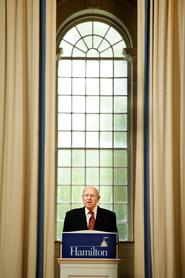
Hamilton provides a wealth of events for students, faculty and guests to attend and at certain times, it’s difficult to choose a favorite one. The events of Fallcoming Weekend were no exception. There was the dedication of Morris House, jazz and a cappella concerts, career discussions and of course, sporting events. But a highlight for many was the talk by Ambassador Thomas Pickering. In front of a packed audience in the Chapel, Ambassador Pickering outlined in detail the background and discussions that have led to the Iran Deal.
Pickering spent over 40 years in the Foreign Service, including time as the United States Ambassador to Russia, India, Israel, Nigeria, Jordan and the United Nations. Currently he is a core member of The Iran Project, co-founded by Bill Luers ’51 who spent more than 30 years with the Foreign Service.
The Iran Project worked to create the Iran Nuclear Deal, which passed Congress over the summer. Pickering explained that for the past eight years, the Obama Administration used sanctions as a way to participate in Iranian negotiations over oil and nuclear weapons. Between 2012 and 2013 the negotiations took full effect and the United States began to influence Iranian foreign policy. Over the course of dozens of meetings, the United States has had to convince Iran that it was not seeking a regime change and that eventually, the sanctions would be lifted.
The Iran Nuclear Deal seeks to limit the nuclear program in Iran to keep the country from producing enough material for nuclear weapons in the short term. Pickering explained that the program is built on a “distrust and verify” mentality. The United States, with the assistance of other countries, will constantly supervise Iranian nuclear facilities. As part of the agreement, Iran is also required to minimize the amount of centrifuges it has available. He said the deal will limit the level and amount of nuclear enrichment possible in Iran.
Pickering also explained that no nuclear capacity can be achieved through importation under the Deal. In return, the United States promised sanctions relief, but not before Iran completes a 12-step program to ensure nuclear weapons cannot be created.
Whether or not the objectives of the Iran Nuclear Deal become a reality is yet to be seen, but Ambassador Pickering’s remarks provided the Hamilton community with an opportunity to understand the diplomacy that has gone into the Deal and the background to understand why an agreement such as this impacts other world players.
While on campus, Ambassador Pickering was presented an honorary degree. Celebrating with him were two other former Ambassadors, Bill Luers ’51 and Nancy Ely-Raphel W ’64. Hamilton also counts three other former ambassadors among its community members, Ned Walker ’62, the Christian A. Johnson Distinguished Professor of Global Political Theory; Prudence Bushnell, founder of the Levitt Leadership Initiative; and Michael Klosson, the current Sol M. Linowitz Professor of International Affairs.
Posted October 6, 2015
